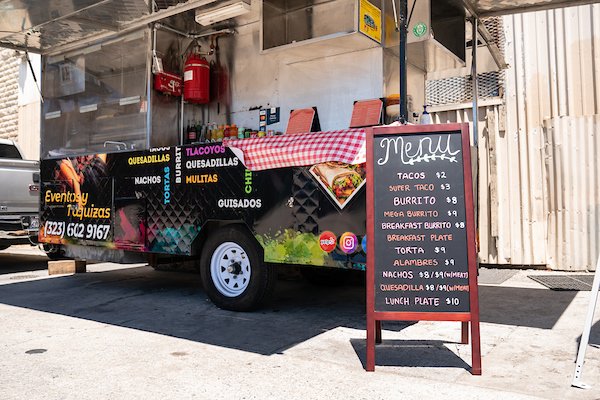La Patrona’s New Food Cart: The Case for Providing Technical Assistance to Street Food Vendors
By Karina Guzman
Elizabeth, owner of La Patrona, with her new Food Cart (Photography by Jon Endow)
On June 17, 2021, Elizabeth, one of our Semi’a Fund microloan clients, realized her dream of becoming a food cart owner after years of being a service worker in the food and consumer goods industries in Los Angeles and Mexico. As her business coach, I’ve learned alongside Elizabeth about the immense work involved in operating a food business. Not only do food business owners have to manage day-to-day business operations and planning, they also have to navigate and abide by lengthy, overly complex local and state regulations. This experience supporting Elizabeth in her efforts to start her food truck business highlighted that investing in technical assistance for small businesses is critical to helping street vendors navigate local and state compliance requirements and setting up their businesses for success.
Two of our other Semia’ Fund clients, Fernando and Rosa, were the previous owners of the food cart. After successfully operating their Mexican food business in Boyle Heights for three years, they decided to sell this truck and expand their business by purchasing larger food trucks. Upon learning about Fernando and Rosa’s desire to sell their business, Inclusive Action connected them to Elizabeth who had long dreamed of being a food cart owner and had recently expressed her frustration with the long wait for a street vending cart to be approved. Fernando and Rosa mentored Elizabeth in the science and art of operating a food business. For 2-3 weeks prior to the sale of the food truck (and even a couple weeks after that) they shared the wisdom they gained over their last three years of victories and setbacks in operating their business. Rosa recalls they were often deflated and discouraged when their business would receive warnings and citations during surprise visits from the LA County Department of Public Health; it wasn’t their intention to operate illegally, they just didn't have anyone guiding them and telling them “this is how you get a permit or license; this is what you need.” Because of the lack of support and information from local governments to start their business, much of Fernando and Rosa’s learning came from those warnings, citations, and other encounters with law enforcement. Currently, obtaining all of the permitting requirements takes many weeks, and sometimes months to acquire. The literature online about what is required is lacking, and often the tools that are provided are meant for other, larger types of businesses. So it is often the case that our clients have to learn what is and isn’t allowed the hard (and much more costly) way.
Elizabeth meeting with Karina, Technical Assistance Coordinator
The Cost of Buying a Food Cart
Elizabeth and Fernando worked closely with Inclusive Action staff to draft, execute, and implement the necessary contracts for selling (in Fernando’s case) and buying (in Elizabeth’s case) the business. After a number of weeks, we were able to secure a food truck inspection and appraisal from a local manufacturer, valuing the cart between $18,000 and $26,000, or nearly two and a half times the average annual income of a street food vendor in LA. Ultimately, both parties agreed upon purchase price and Elizabeth became a food cart owner.
The Cost of Being A Food Vendor
Elizabeth’s life has substantially changed since becoming a food vendor. Like many small business owners, she now carries the weight of running a successful business to support her family. Elizabeth now wakes up at 6AM to get her day started. She packs her pick-up truck with a day’s worth of food, drinks, and supplies, all prepared the night before after coming home. She makes her trip from Boyle Heights to Montebello to pick up the food truck from the commissary, and then heads back to Boyle Heights to open up her business. Elizabeth sets up on Anderson Street just south of 4th Street and begins her day cooking and selling from 8AM to 2PM. At close, she cleans and loads everything back up into the pick-up truck and makes her commute back to the commissary where she stores the food truck overnight, and finally makes her way back home, arriving between 5 and 6PM.
You can imagine the physical strain Elizabeth and other food vendors experience daily as they work 12+ hour shifts, seven days a week to earn a living. But often, especially during the pandemic, they find themselves not making enough sales to cover their high overhead costs that have now been exacerbated by inflation and global supply chain shortages. A simple calculation of Elizabeth’s overhead costs show that her monthly expenditures are upwards of $5,000, broken down below. What’s more, this list doesn’t include annual costs such as tax payments, vehicle insurance, and health permit costs nor one-time start-up costs such as ‘wrapping’ her truck and marketing material costs.
Being a female food vendor and mother provides its own unique set of challenges for Elizabeth. As a female food vendor, top of mind is whether she’s being taken advantage of by merchants, looking out for her safety as she operates mainly a cash based business servicing male clients in a not-so-trafficked area, and learning new things that she didn't need to worry about before like the mechanics of a food truck. Most strenuous has been navigating being a full-time mother and a full-time business owner. Elizabeth’s role as a mother never stops even if she’s not physically home with her daughters. This means that she now has the double duty of caring for her business’s success while also caring for her daughters’ mental, emotional, and physical wellbeing. Elizabeth is constantly weighing the opportunity cost of foregoing a business opportunity - such as working on the weekends - to be with her daughters or vice versa. She has to choose time with her daughters or getting business to provide for her family. When we think about the overhead costs food vendors are expected to absorb, we must think about their quality of life and family commitments. These costs squeeze many food vendors to sacrifice family time. Food vendors operate in the paradigm of being expected to make sense of complex processes to operate legally, cover high overhead costs, and yet keep their food prices relatively inexpensive. How can we possibly expect them to succeed?
Elizabeth’s cart
Supporting Food Vendors Going Forward
Five months in, Elizabeth has covered substantial ground in getting her business up and running with the help of our technical assistance, and Fernando and Rosa’s mentorship. However, even with our help, her sales continue to be low, meaning she doesn’t have enough to hire an employee and cover her overhead expenses. We’ve brainstormed ideas to help her increase her sales and retain clients: renting her cart on the weekends when she isn’t working, mobile delivery options, and working to secure catering gigs with local breweries or companies. But these suggestions have not been easy to implement.
My experience helping Elizabeth prepare for and establish her new food business taught me a few first-hand lessons, many of which groups like the LA Street Vendor Campaign have been advocating for years. The first was that investing in technical assistance programming is critical to supporting our street vendors. Often times they have little to no support elsewhere and we, as their business coach, help them navigate the cumbersome processes of what they need to do to operate legally, think strategically through the development, marketing, and finances of their business, and be someone in their corner - saying “yes, I’ll help you” in the midst of countless “no’s” they've received. The second lesson is I can’t guarantee the success of a business as a business coach. Food vendors rely on customers like you and me to keep their businesses open. Our business supports their livelihood. We can all support our food vendors by purchasing their goods and services! Lastly, I see how very few street vendors can take the leap into formalizing their businesses due to the extreme overhead costs and bureaucratic permitting processes that food vendors face (outlined in detail in the Unfinished Business Report written by Public Counsel and UCLA School of Law Community Economic Development Clinic). There is a need for continued advocacy to thoughtfully update the rules of operation for food street vendors if we are going to support them in entering and staying afloat in the formal economy.
Being a new food vendor in LA provides its unique set of challenges that come on top of the already existing challenges that food vendors face because of systemic racism. Our technical assistance programming is a guiding hand and emotional support for our micro-entrepreneur food vendors. To support our micro-entrepreneurs the government must invest in updating the system of business operations and technical support, and we as individuals should take it upon ourselves to directly support our micro-entrepreneurs by buying their products, spreading the word, and joining them in their fight for an equitable path forward.




